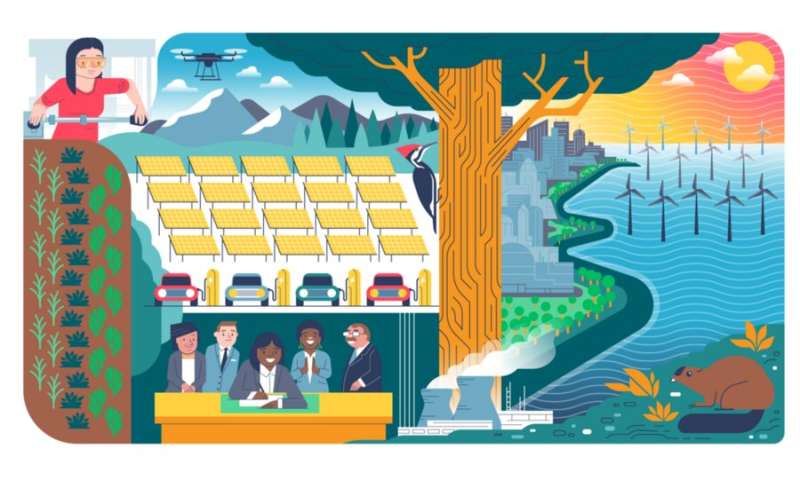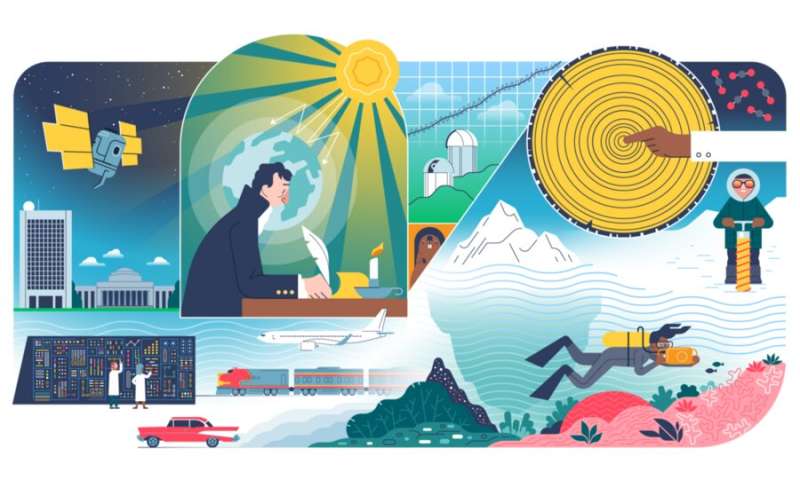by Massachusetts Institute of Technology

A graphic from the revamped MIT Climate Portal illustrates the section of the website on What Can Be Done About Climate Change? Credit: Rick Pinchera
Stepping up its ongoing efforts to inform and empower the public on the issue of climate change, MIT today announced a dramatic overhaul of the MIT Climate Portal, climate.mit.edu, which provides timely, science-based information about the causes and consequences of climate change—and what can be done to address it.
"From vast wildfires to an unusually active hurricane season, we are already getting a glimpse of what our climate-changed future looks like," says Maria T. Zuber, MIT's vice president for research. "With this website, we aim to communicate in rigorous but accessible ways what the science tells us: Yes, human-caused climate change is an urgent, serious problem; and yes, we can do something about it. Addressing climate change is an institutional priority, and this kind of public engagement is one way we hope to accelerate solutions."
Survey research shows that increasing numbers of people, both in the United States and around the world, are concerned about climate change. But in the U.S., research also shows that members of the public rarely hear about or discuss the issue. Researchers at the Yale Program on Climate Change Communication and the George Mason University Center for Climate Change Communication have suggested that there might exist a climate change "spiral of silence," in which "even people who care about the issue shy away from discussing it because they so infrequently hear other people talking about it."
MIT's efforts at public engagement on climate change are intended to help break this "spiral"—encouraging people to discuss climate change while also providing them with resources to discuss it in a way informed by the latest science and research. These engagement efforts are part of a commitment the Institute made in its 2015 Plan for Action on Climate Change "to offer the public a trusted source of climate change information, to engage leaders and citizens in the effort for solutions, and to use MIT's expertise in online education to dramatically expand our reach."
"We often talk about reaching people whom we call the 'climate curious' –— people who want to learn more about what climate change means for them and their communities and, of course, what they can do about it," says John Fernández, the director of the MIT Environmental Solutions Initiative and a professor in the Department of Architecture. "Our goal is for this website to become a dependable resource for people across the U.S. and all over the world, so that they can have effective conversations about the urgency of the climate problem and our ability, even now, to reduce the grave risks it presents."

Stepping up its ongoing efforts to inform and empower the public on the issue of climate change, MIT today announced a dramatic overhaul of the MIT Climate Portal, climate.mit.edu, which provides timely, science-based information about the causes and consequences of climate change—and what can be done to address it.
"From vast wildfires to an unusually active hurricane season, we are already getting a glimpse of what our climate-changed future looks like," says Maria T. Zuber, MIT's vice president for research. "With this website, we aim to communicate in rigorous but accessible ways what the science tells us: Yes, human-caused climate change is an urgent, serious problem; and yes, we can do something about it. Addressing climate change is an institutional priority, and this kind of public engagement is one way we hope to accelerate solutions."
Survey research shows that increasing numbers of people, both in the United States and around the world, are concerned about climate change. But in the U.S., research also shows that members of the public rarely hear about or discuss the issue. Researchers at the Yale Program on Climate Change Communication and the George Mason University Center for Climate Change Communication have suggested that there might exist a climate change "spiral of silence," in which "even people who care about the issue shy away from discussing it because they so infrequently hear other people talking about it."
MIT's efforts at public engagement on climate change are intended to help break this "spiral"—encouraging people to discuss climate change while also providing them with resources to discuss it in a way informed by the latest science and research. These engagement efforts are part of a commitment the Institute made in its 2015 Plan for Action on Climate Change "to offer the public a trusted source of climate change information, to engage leaders and citizens in the effort for solutions, and to use MIT's expertise in online education to dramatically expand our reach."
"We often talk about reaching people whom we call the 'climate curious' –— people who want to learn more about what climate change means for them and their communities and, of course, what they can do about it," says John Fernández, the director of the MIT Environmental Solutions Initiative and a professor in the Department of Architecture. "Our goal is for this website to become a dependable resource for people across the U.S. and all over the world, so that they can have effective conversations about the urgency of the climate problem and our ability, even now, to reduce the grave risks it presents."

A graphic from the revamped MIT Climate Portal illustrating the section of the website on What We Know About Climate Change? Credit: Rick Pinchera
Managed by the MIT Environmental Solutions Initiative, the MIT Climate Portal features a range of content, including a comprehensive climate change primer and climate-related news from all corners of the Institute. New features launched today include brief "explainers," written by faculty and scientists at MIT, that provide high-level overviews of important topics like wildfires, carbon pricing, renewable energy, and ocean acidification. Also new to the website is an "Ask MIT Climate" feature, where members of the public can get answers to their own questions about climate change. (If you have a question about climate change that you would like the MIT Climate Portal to answer, email climate@mit.edu.)
The site also offers a clearinghouse of everything climate-related happening at MIT, from events to course offerings, to keep interested students, alumni, parents, faculty, and staff members up to date. Just as importantly, it creates a digital meeting place for members of the MIT community to share their latest work on climate change. Faculty, students, and staff across the Institute for years have made significant contributions to improving public understanding of and engagement with climate change, with tools like the climate simulators created by the MIT Sloan Sustainability Initiative; the Climate CoLab platform; and a number of public events, contests, and educational materials. The site will make these resources accessible in one place.
In addition to the MIT Climate Portal, MIT had previously launched two other digital resources for the public: an online, Webby Award-winning interactive primer on climate change, and a podcast series, TILclimate (short for "Today I Learned: Climate"). Both of these resources are accessible through the portal.
By enlisting MIT students in editorial aspects of the new website, the project is also proving to be a valuable hands-on educational tool. For example, for the "Ask MIT Climate" feature, students take questions about climate change submitted by users and then, under the guidance of MIT faculty members, research the answers and write responses.
"We see this as a powerful learning opportunity, a way for MIT students to strengthen their content knowledge about climate change, energy, and sustainability, but also to improve their ability to effectively communicate complex science and engineering topics to diverse audiences, a critical skill that will serve them well after they leave MIT," says Fernández.
The new website is not static: New content will be developed and added over time, and all departments, labs, and centers at MIT that work on climate change are invited to contribute to it. Members of the MIT community who want to learn more about getting involved, or who have ideas for subjects to cover, are encouraged to contact the Climate Portal team.
Explore further
Managed by the MIT Environmental Solutions Initiative, the MIT Climate Portal features a range of content, including a comprehensive climate change primer and climate-related news from all corners of the Institute. New features launched today include brief "explainers," written by faculty and scientists at MIT, that provide high-level overviews of important topics like wildfires, carbon pricing, renewable energy, and ocean acidification. Also new to the website is an "Ask MIT Climate" feature, where members of the public can get answers to their own questions about climate change. (If you have a question about climate change that you would like the MIT Climate Portal to answer, email climate@mit.edu.)
The site also offers a clearinghouse of everything climate-related happening at MIT, from events to course offerings, to keep interested students, alumni, parents, faculty, and staff members up to date. Just as importantly, it creates a digital meeting place for members of the MIT community to share their latest work on climate change. Faculty, students, and staff across the Institute for years have made significant contributions to improving public understanding of and engagement with climate change, with tools like the climate simulators created by the MIT Sloan Sustainability Initiative; the Climate CoLab platform; and a number of public events, contests, and educational materials. The site will make these resources accessible in one place.
In addition to the MIT Climate Portal, MIT had previously launched two other digital resources for the public: an online, Webby Award-winning interactive primer on climate change, and a podcast series, TILclimate (short for "Today I Learned: Climate"). Both of these resources are accessible through the portal.
By enlisting MIT students in editorial aspects of the new website, the project is also proving to be a valuable hands-on educational tool. For example, for the "Ask MIT Climate" feature, students take questions about climate change submitted by users and then, under the guidance of MIT faculty members, research the answers and write responses.
"We see this as a powerful learning opportunity, a way for MIT students to strengthen their content knowledge about climate change, energy, and sustainability, but also to improve their ability to effectively communicate complex science and engineering topics to diverse audiences, a critical skill that will serve them well after they leave MIT," says Fernández.
The new website is not static: New content will be developed and added over time, and all departments, labs, and centers at MIT that work on climate change are invited to contribute to it. Members of the MIT community who want to learn more about getting involved, or who have ideas for subjects to cover, are encouraged to contact the Climate Portal team.
Explore further
More information: MIT Climate Portal: climate.mit.edu/
Provided by Massachusetts Institute of Technology
No comments:
Post a Comment